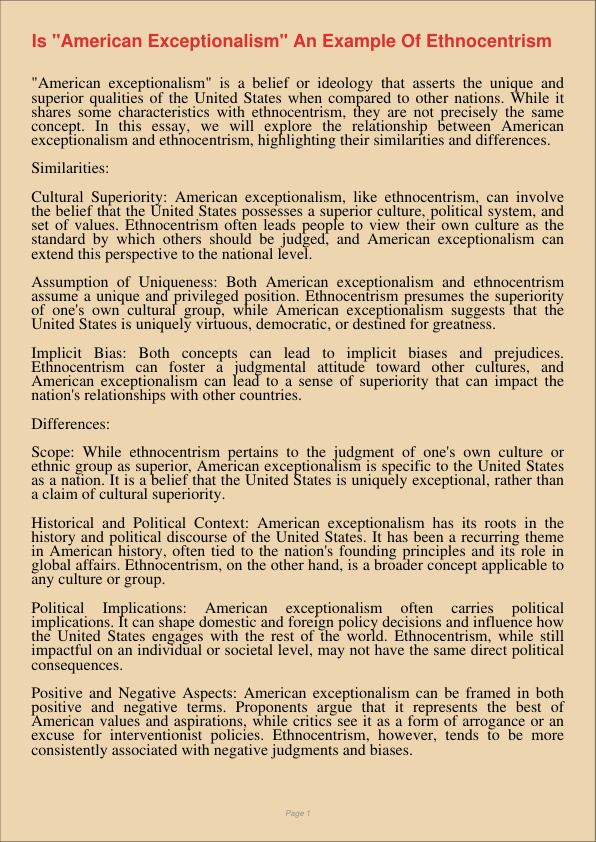“American exceptionalism” is a belief or ideology that asserts the unique and superior qualities of the United States when compared to other nations. While it shares some characteristics with ethnocentrism, they are not precisely the same concept. In this essay, we will explore the relationship between American exceptionalism and ethnocentrism, highlighting their similarities and differences.
Similarities:
Cultural Superiority: American exceptionalism, like ethnocentrism, can involve the belief that the United States possesses a superior culture, political system, and set of values. Ethnocentrism often leads people to view their own culture as the standard by which others should be judged, and American exceptionalism can extend this perspective to the national level.
Assumption of Uniqueness: Both American exceptionalism and ethnocentrism assume a unique and privileged position. Ethnocentrism presumes the superiority of one’s own cultural group, while American exceptionalism suggests that the United States is uniquely virtuous, democratic, or destined for greatness.
Implicit Bias: Both concepts can lead to implicit biases and prejudices. Ethnocentrism can foster a judgmental attitude toward other cultures, and American exceptionalism can lead to a sense of superiority that can impact the nation’s relationships with other countries.
Differences:
Scope: While ethnocentrism pertains to the judgment of one’s own culture or ethnic group as superior, American exceptionalism is specific to the United States as a nation. It is a belief that the United States is uniquely exceptional, rather than a claim of cultural superiority.
Historical and Political Context: American exceptionalism has its roots in the history and political discourse of the United States. It has been a recurring theme in American history, often tied to the nation’s founding principles and its role in global affairs. Ethnocentrism, on the other hand, is a broader concept applicable to any culture or group.
Political Implications: American exceptionalism often carries political implications. It can shape domestic and foreign policy decisions and influence how the United States engages with the rest of the world. Ethnocentrism, while still impactful on an individual or societal level, may not have the same direct political consequences.
Positive and Negative Aspects: American exceptionalism can be framed in both positive and negative terms. Proponents argue that it represents the best of American values and aspirations, while critics see it as a form of arrogance or an excuse for interventionist policies. Ethnocentrism, however, tends to be more consistently associated with negative judgments and biases.
In summary, while American exceptionalism and ethnocentrism share some similarities, they are distinct concepts. American exceptionalism is a belief about the unique qualities of the United States as a nation, rooted in its history and political discourse. Ethnocentrism, on the other hand, is a broader concept concerning the judgment of one’s own culture or ethnic group as superior. Both ideas can foster biases and prejudices, but they have different scopes and implications. It’s important to recognize and critically examine these beliefs to foster understanding and respectful relations with other cultures and nations.

「真诚赞赏,手留余香」
真诚赞赏,手留余香
使用微信扫描二维码完成支付
